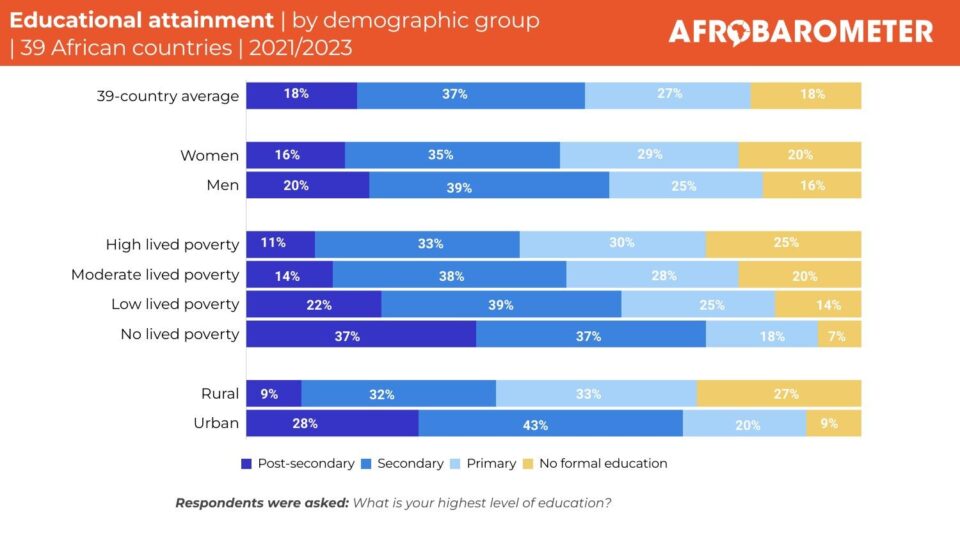New Afrobarometer Report Shows
A majority of Africans are dissatisfied with their government’s efforts to provide public education, the latest Afrobarometer Pan-Africa Profile shows.
Based on national surveys in 39 African countries, the report shows that younger generations have more education than their elders, but women, poor people, and rural residents face persistent disadvantages in educational attainment.
Among adults who had recent contact with a public school, most say they found it easy to obtain the services they needed and were treated with respect. But the findings also highlight the widespread problem of out-of-school children and demands for bribes in exchange for services.
While countries vary widely in their experiences and assessments, a majority of Africans are dissatisfied with their government’s performance on education, though they appreciate their leaders’ efforts to minimise disruptions to schooling due to COVID-19.
Key findings
- On average across 39 African countries, more than half (55%) of adults have secondary (37%) or post-secondary (18%) education, while 27% have primary schooling and 18% have no formal education (Figure 1).
- Younger Africans have more education than their elders. About two-thirds (65%) of respondents aged 18-35 have had at least some secondary education, compared to 52%, 44%, and 35% of the progressively older cohorts.
- Women are less likely than men to have secondary or post-secondary education (51% vs. 59%) and more likely to lack formal education altogether (20% vs. 16%).
- The poorest respondents are more than three times as likely as the best-off to lack formal schooling (25% vs. 7%) and less than one-third as likely to have post-secondary qualifications (11% vs. 37%).
- The same pattern holds for rural vs. urban residents: 27% vs. 9% lack formal schooling, and 9% vs. 28% have post-secondary education.
- Among citizens who had contact with public schools during the previous year, three-fourths (74%) say they found it easy to obtain the services they needed (Figure 2).
- And three-fourths (74%) say that teachers or other school officials treated them with respect (Figure 3).
But one in five (19%) say they had to pay a bribe to get the needed services, ranging from 2% in Cabo Verde to 50% in Liberia. Poor respondents are twice as
- likely as well-off citizens to report having to pay a bribe to a teacher or school official.
- Almost half (48%) of Africans say school-age children who are not in school are a “somewhat frequent” or “very frequent” problem in their community, reaching as high as 83% in Liberia and 71% in Angola (Figure 4).
- Fewer than half (46%) of Africans think their government is performing “fairly well” or “very well” on education, while 52% give their leaders poor marks (Figure 5).
Afrobarometer surveys
Afrobarometer is a pan-African, non-partisan survey research network that provides reliable data on African experiences and evaluations of democracy, governance, and quality of life. Nine survey rounds in up to 42 countries have been completed since 1999. Round 9 surveys (2021/2023) cover 39 countries.
Afrobarometer’s national partners conduct face-to-face interviews in the language of the respondent’s choice with samples of 1,200-2,400 adults that yield country-level results with margins of error of +/-3 to +/-2 percentage points at a 95% confidence level.
Charts
Figure 1: Educational attainment | by demographic group | 39 countries | 2021/2023
Respondents were asked: What is your highest level of e

